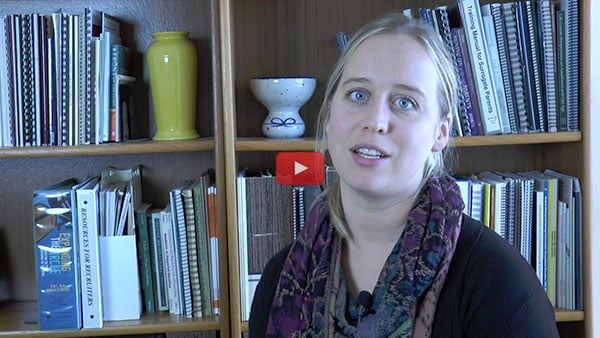Postsecondary Education

Preparing for Postsecondary Education: What Families Need to Know
Postsecondary education is an exciting opportunity for all youth, including those with disabilities. Going to college today can mean attending a 4-year college or university, a 2-year community college, or a technical institute or trade school. It can mean studying full-time or part-time, or living at school or commuting from home. Learning and earning go hand-in-hand. The more years of schooling your youth completes, the higher his or her income is likely to be. The wide variety of postsecondary educational programs currently available for youth makes exploring options with your son or daughter an exciting process.
Although postsecondary students with disabilities are entitled to certain protections, the process for accessing accommodations is much different than in high school. Youth must take a more active role in knowing their rights and advocating for needed supports. This means they must know about their disability and the accommodations they need to be successful. Families play an important role in helping their young adults learn self-advocacy skills, as well as their rights as a person with a disability.
Ask an Advocate: Common Questions and Answers about Postsecondary Education
Postsecondary education is any education after graduation from high school. It includes two- and four-year colleges, as well as postsecondary career training programs. The term “college” is used below as shorthand to indicate any type of postsecondary education or training program.
Parents may have a lot of questions about the differences between high school and college, leading to insecurities about what will happen next. Below are questions that families frequently ask PACER staff about postsecondary education and accommodations. If you have questions that are not answered or need more specific assistance, please contact PACER’s National Parent Center on Transition and Employment at (952)838-9000 or [email protected].
Laws and Rights
Is a 504 plan or an Individualized Education Program (IEP) better for college?
It is important to know that 504 plans and IEPs do not transfer with the student to college and no longer apply once a student receives their diploma. IEPs only apply through high school. While protections of Section 504 of the Rehabilitation Act apply in postsecondary settings, colleges do not develop or implement a written “504 plan.”
Because the Americans with Disabilities Act’s (ADA) definition of disability differs from that in the Individuals with Disabilities Education Act (IDEA), a student who has had special education services in high school will not necessarily be eligible for accommodations in a postsecondary program. Each student’s eligibility to receive accommodations is determined by the postsecondary program on a case-by-case basis based on the ADA’s definition of disability – a physical or mental impairment that substantially limits one or more major life activities.
Do I have a right to see my son’s or daughter’s record and grades in college? What if I’m the one paying the tuition?
The Family Educational Rights and Privacy Act (FERPA) is a federal law that gives parents of students in elementary and secondary schools (excluding those schools who do not receive federal funding) certain rights pertaining to their child’s education records. Among other things, FERPA gives parents the right to have access to their child’s school records.
One aspect of FERPA that tends to take families by surprise is that “ownership” of the educational data switches from the parent to the student once a student turns 18, or younger than 18 upon enrollment in a postsecondary institution (regardless of who is paying the tuition or the presence of a disability). This means that once a student attends college, the parent no longer has an automatic right to see data such as grades. Permission for that access needs to be granted in writing by the student and still may not be honored by the school.
What laws protect my son or daughter with a disability in college? What are their rights?
Many parents of students with disabilities have learned the basics of the Individuals with Disabilities Education Act (IDEA). However, they are often less familiar with the Americans with Disabilities Act (ADA) and Section 504 of the Rehabilitation Act, the laws that ensure students with disabilities have equal access to postsecondary education
It is important that students and their parents and other advocates become knowledgeable about their rights and responsibilities in postsecondary education. Although protections exist, students have considerably more responsibility in postsecondary education to request their own accommodations. This responsibility is ongoing. For many students with disabilities, good self-advocacy skills are the key to success, and knowing their rights is one essential element of effective self-advocacy.
Entrance and Admissions
Can there be modifications to the entrance requirements (e.g. language courses)?
In order to be eligible for accommodations and be protected from discrimination at the postsecondary level, a student must be “otherwise qualified 1” to attend the postsecondary institution. That is, they must meet the admissions requirements for all students. Under the ADA programs are required to modify their policies, practices, or procedures to make them accessible. An example of such modifications could include substituting specific courses. However, modifications of policies and practices are not required when they would fundamentally alter the nature of the service, program, or activity. Fundamental alteration would likely occur by waiving prerequisite classes required before a student could take core college level classes.
Disability Disclosure, Accommodations and Supports
Are students with disabilities required to disclose their disability? What documentation must be provided?
If students do not require any accommodations, they can choose to keep information about their disability private. If they need accommodations because of their disability, however, students must disclose in order to receive them. It is a student’s responsibility to make their needs known in advance.
Postsecondary programs may not discriminate on the basis of disability, but they may and likely will request documentation of a disability when accommodations are requested. If a person has a visible disability (such as being blind or deaf or using a wheelchair), no further documentation may be necessary. For those with hidden disabilities, such as learning disabilities, mental health disorders, or chronic health conditions, it is reasonable and appropriate for a program to request current documentation to establish the validity of the request for accommodations and to identify the accommodations needed.
Documentation should be completed and signed by a professional familiar with the applicant and the applicant’s disability, such as a physician, psychologist, special education evaluator, or rehabilitation counselor. It should verify the disability and suggest appropriate accommodations. If previous documentation exists, it will likely be sufficient if it is current (usually less than three years old). If no current documentation is available, it is the responsibility of the student to have new documentation prepared. This can sometimes mean paying to have a new evaluation done. Be sure to check with the Disabilities Services Office (DSO) prior to enrollment regarding requirements, timeline, process, etc.
What is the process of getting my son or daughter the help (accommodations) they need in college?
Students, not their parents, are responsible for taking the lead in requesting needed accommodations. Students must first disclose their disability to the DSO at the college and request accommodations. They should do this before classes begin. Depending on the individual and the college’s requirements, they may ask for documentation of the disability (see above). The student, staff at the DSO, and sometimes professors will then collaborate to determine the academic adjustments and auxiliary aids necessary for the student to access the program of study. Professors may be involved in the “interactive process” when determining and negotiating reasonable accommodations. Colleges have different processes when it comes to communicating approved accommodations with professors. Often a letter of accommodation is written but it may be the responsibility of the student to deliver the letter and communicate directly with the professors.
What academic accommodations will be provided for my son or daughter?
A college must ensure that the programs it offers, including extracurricular activities, are accessible to students with disabilities. Postsecondary programs can do this in a number of ways, including providing aids and services necessary for effective communication and by modifying policies, practices, and procedures when necessary for equal access.
Qualified interpreters, assistive listening systems, captioning, TTYs, qualified readers, audio recordings, taped texts, Braille materials, large print materials, accessible online materials, and adapted computers are examples of auxiliary aids and services that provide effective communication. Such services must be provided unless doing so would result in a fundamental alteration of the program or would result in undue financial or administrative burdens.
Modifications to classroom policies or practices will vary, based on the individual student’s needs. Some examples include:
- Rescheduling classes to an accessible location
- Using early enrollment options to allow time to arrange accommodations
- Providing a syllabus prior to the beginning of class
- Clearly communicating course requirements, assignments, due dates, grading criteria both orally and in written form.
- Providing outlines or summaries of class lectures
- Allowing students to use note takers or record lectures
- Allowing part-time students with disabilities, whose disability prevents them from taking a full-time course load, to qualify for financial aid
- Allowing a student extended time to complete a test or to complete a test in a distraction-free space
- Allowing a student to use a reader or scribe
What other supports will be available for my son or daughter? Will there be tutoring or social supports provided? What about Personal Care Assistants (PCAs)?
Colleges are not required to provide tutoring, social supports, or personal care assistance for students with disabilities. Many colleges have campus-wide tutoring programs and social opportunities to meet people and make connections. Some colleges offer a wide variety of supports while others offer just the basics. When touring potential colleges, it is important to ask questions and learn about the resources provided to students with disabilities and all students in general.
Disputes
What if a professor refuses to provide an approved accommodation?
Problem-solving can happen at many levels at college. As a first step, a student may wish to meet with the professor during their office hours or other one-on-one setting in order to clarify the need for the accommodation and make a personal connection. Students may also wish to include someone from the disability services office to help mediate the conversation and share the rationale for the approved accommodation. Sometimes a professor may offer an alternative accommodation that is agreeable to the student and doesn’t alter the program of study.
What if I believe the school is discriminating against my son or daughter?
If problem-solving techniques do not work, there are some steps to take when a student feels they are experiencing discrimination. Each school must have grievance procedures or a way to file a complaint with the hope of an equitable resolution. Make sure to read the student handbook to verify these procedures and follow the appropriate steps.
Nearly every college has someone on staff called a Section 504 Coordinator or ADA Coordinator. Contact this person with your questions about the process or to file a complaint.
A student can also file a complaint with the Office for Civil Rights (OCR) if they are not satisfied with the results of the complaint filed with the college or at any time.

|
Preparing for Postsecondary EducationYouth with disabilities are entering postsecondary education in increasing numbers and finding great success. For many, the key to that success is using high school classes, career exploration and campus tours to prepare for what is expected out of a college student. |

|
Selecting the Right ProgramEducation or training after high school is a great opportunity for youth to explore programs that meet their interests and that help them build skills for future employment. It is crucial that youth and families inform themselves about the many different types of programs and areas of study that are available, and which ones might be the best fit. |

|
Campus LifeGoing off to college is a new experience for every youth. It’s a great opportunity to learn new things, make new friends, further explore interests and practice living independently. Youth with disabilities may need to make additional preparations to be successful on campus. Consider such things as health management, transportation, and social skills when preparing youth for campus life. |

|
Understanding Academic AccommodationsColleges are not responsible for making sure students with disabilities are successful academically, just that they have access to the same educational opportunities as every other student. College students with disabilities often use academic accommodations so they can do the same course work as their peers. Parents and youth should seek to understand the accommodations process and what accommodations work best for each individual student. |

|
Financial AidIt is crucial that youth and families begin planning for how postsecondary education costs will be covered as early as possible. This includes knowing when to submit financial aid paperwork, accessing programs that may help cover certain costs and using other savings strategies. |

|
Knowing Your Rights and ResponsibilitiesStudents with disabilities in postsecondary education are protected from discrimination based on disability. They also have certain responsibilities to make sure those protections are in place. Youth and families should inform themselves about rights, responsibilities, and what to do if a complaint arises. |

|
Inclusive Postsecondary Education for Students with Intellectual DisabilitiesLearn why inclusive postsecondary education is important (and possible!) for students with intellectual disabilities, how to find the right program, how to prepare, and how to stay involved and supportive throughout their journey. |

